I'm running selenium tests inside a docker container, with Firefox and Geckodriver. When running that container as root, everything works fine.
When running the container as non-root user (USER 1000), the driver fails to initialize :
[[1;31mERROR[m] test01_WO_default_dashboard Time elapsed: 132.6 s <<< ERROR!
org.openqa.selenium.TimeoutException:
Failed to read marionette port
Build info: version: '3.14.0', revision: 'aacccce0', time: '2018-08-02T20:19:58.91Z'
System info: host: 'testrunner-cockpit-3--1-mdbwj', ip: '10.130.2.18', os.name: 'Linux', os.arch: 'amd64', os.version: '4.18.0-305.28.1.el8_4.x86_64', java.version: '11.0.15'
Driver info: driver.version: FirefoxDriver
remote stacktrace:
at java.base/jdk.internal.reflect.NativeConstructorAccessorImpl.newInstance0(Native Method)
at java.base/jdk.internal.reflect.NativeConstructorAccessorImpl.newInstance(NativeConstructorAccessorImpl.java:62)
at java.base/jdk.internal.reflect.DelegatingConstructorAccessorImpl.newInstance(DelegatingConstructorAccessorImpl.java:45)
at java.base/java.lang.reflect.Constructor.newInstance(Constructor.java:490)
at org.openqa.selenium.remote.W3CHandshakeResponse.lambda$new$0(W3CHandshakeResponse.java:57)
at org.openqa.selenium.remote.W3CHandshakeResponse.lambda$getResponseFunction$2(W3CHandshakeResponse.java:104)
at org.openqa.selenium.remote.ProtocolHandshake.lambda$createSession$0(ProtocolHandshake.java:122)
at java.base/java.util.stream.ReferencePipeline$3$1.accept(ReferencePipeline.java:195)
at java.base/java.util.Spliterators$ArraySpliterator.tryAdvance(Spliterators.java:958)
at java.base/java.util.stream.ReferencePipeline.forEachWithCancel(ReferencePipeline.java:127)
at java.base/java.util.stream.AbstractPipeline.copyIntoWithCancel(AbstractPipeline.java:502)
at java.base/java.util.stream.AbstractPipeline.copyInto(AbstractPipeline.java:488)
at java.base/java.util.stream.AbstractPipeline.wrapAndCopyInto(AbstractPipeline.java:474)
at java.base/java.util.stream.FindOps$FindOp.evaluateSequential(FindOps.java:150)
at java.base/java.util.stream.AbstractPipeline.evaluate(AbstractPipeline.java:234)
at java.base/java.util.stream.ReferencePipeline.findFirst(ReferencePipeline.java:543)
at org.openqa.selenium.remote.ProtocolHandshake.createSession(ProtocolHandshake.java:125)
at org.openqa.selenium.remote.ProtocolHandshake.createSession(ProtocolHandshake.java:73)
at org.openqa.selenium.remote.HttpCommandExecutor.execute(HttpCommandExecutor.java:136)
at org.openqa.selenium.remote.service.DriverCommandExecutor.execute(DriverCommandExecutor.java:83)
at org.openqa.selenium.remote.RemoteWebDriver.execute(RemoteWebDriver.java:548)
at org.openqa.selenium.remote.RemoteWebDriver.startSession(RemoteWebDriver.java:212)
at org.openqa.selenium.remote.RemoteWebDriver.<init>(RemoteWebDriver.java:130)
at org.openqa.selenium.firefox.FirefoxDriver.<init>(FirefoxDriver.java:125)
Relevant parts of my Dockerfile :
FROM ubuntu:20.04
# install firefox
ARG FIREFOX_VERSION=latest
RUN FIREFOX_DOWNLOAD_URL=$(if [ $FIREFOX_VERSION = "latest" ] || [ $FIREFOX_VERSION = "nightly-latest" ] || [ $FIREFOX_VERSION = "devedition-latest" ] || [ $FIREFOX_VERSION = "esr-latest" ]; then echo "https://download.mozilla.org/?product=firefox-$FIREFOX_VERSION-ssl&os=linux64&lang=en-US"; else echo "https://download-installer.cdn.mozilla.net/pub/firefox/releases/$FIREFOX_VERSION/linux-x86_64/en-US/firefox-$FIREFOX_VERSION.tar.bz2"; fi) \
&& apt-get update -qqy \
&& apt-get -qqy --no-install-recommends install firefox libavcodec-extra \
&& rm -rf /var/lib/apt/lists/* /var/cache/apt/* \
&& wget --no-verbose -O /tmp/firefox.tar.bz2 $FIREFOX_DOWNLOAD_URL \
&& apt-get -y purge firefox \
&& rm -rf /opt/firefox \
&& tar -C /opt -xjf /tmp/firefox.tar.bz2 \
&& rm /tmp/firefox.tar.bz2 \
&& mv /opt/firefox /opt/firefox-$FIREFOX_VERSION \
&& ln -fs /opt/firefox-$FIREFOX_VERSION/firefox /usr/bin/firefox
# install geckodriver
ARG GECKODRIVER_VERSION=latest
RUN GK_VERSION=$(if [ ${GECKODRIVER_VERSION:-latest} = "latest" ]; then echo "0.31.0"; else echo $GECKODRIVER_VERSION; fi) \
&& echo "Using GeckoDriver version: "$GK_VERSION \
&& wget --no-verbose -O /tmp/geckodriver.tar.gz https://github.com/mozilla/geckodriver/releases/download/v$GK_VERSION/geckodriver-v$GK_VERSION-linux64.tar.gz \
&& rm -rf /opt/geckodriver \
&& tar -C /opt -zxf /tmp/geckodriver.tar.gz \
&& rm /tmp/geckodriver.tar.gz \
&& mv /opt/geckodriver /opt/geckodriver-$GK_VERSION \
&& chmod 755 /opt/geckodriver-$GK_VERSION \
&& ln -fs /opt/geckodriver-$GK_VERSION /usr/bin/geckodriver \
&& geckodriver --version
I even added some chmod / chown to try and fix some permissions issues with firefox or geckodriver :
RUN chown 1000 -R /usr/bin/geckodriver \
&& chmod 775 -R /usr/bin/geckodriver \
&& chown 1000 -R /usr/bin/firefox \
&& chmod 775 -R /usr/bin/firefox
And finally the USER instruction to run the container as non-root
USER 1000
I do not manually install selenium. It's a maven dependency of the project I'm installing where my tests sources are.


